Serbest Piyasa Ahi Evranları: Anadolu'da Yükselen Yeni Kalkınma Ahlakı
Bu çalışmada küreselleşme ile gelen serbest piyasa modellerinin çoğulluklarından hareketle Anadolu'daki ekonomik yükselişin kalkınma ahlakı açıklanılmaya çalışılmaktadır. Bu çerçevede Anadolu'da, Kayseri örneğinde ortaya çıkan iktisadî kalkınmanın kadrocu gelenekten uzaklaşarak yerel, tarihsel, geleneksel ve dinsel temelleriyle uzlaşarak yeni bir ahlak temelinde yükseldiği ileri sürülmektedir. Sabri Ülgener'in iktisadî kalkınma ahlakı ile ilgili yaklaşımları bu konuda önemli temeller sağladığı gösterilecektir. Zihniyet açıklamalarıyla Weber'le benzerlikler taşımasına karşın, Ülgener, geleneğin dayanışma kültürünün deneyimlerinden hareket ederek dayanışma vurgulu açıklamalar yaparak farklılaşmaktadır.Böylece çalışmamızda hem küresel serbest piyasa modellerinden biri olmaya aday potansiyel niteliği taşıyan Anadolu kalkınma ahlakının varlığı ileri sürülmekte hem de Sabri Ülgener'in sosyal teorisiyle toplumsal olgularımızı açıklamanın Weber'in Protestan Ahlakı tezinden daha geçerli olabileceği gerçeği ileri sürülmektedir.
Anahtar Kelimeler:
Kalkınma ahlakı, Dayanışma, Kadrocu ekonomi, Serbest piyasa
The Ahi Evrans of Free Market: The New Rising of Development Ethics of Anatolia
Within the globalization process the overall social relationships network
have changed fundamentally. In this context the dirigisme and cadreist economic policies
of cold war period began to be discarded, while free market model economy spread
and raised its effectiveness. The ambience of the global age based on knowledge and
satellite technology also facilitates and spreads this efficiency. By this way, free market
model of development enjoys an unrivalled status in the new technological and political
age. This model also raises different mentalities of development around the world stem
from different cultural motivations in different civilization zones. Consequently there
appears different ethics of developments of the free market. In that case, how can we
understand the mentality of the new economic development in Anatolia? Where does it
stand upon? How and in what terms does its ethic meet with free market model of global
age? Can it be interpreted as Islamic Calvinism as some European social scientists
claim?
This study attempts to analyze the ethic of economic development in Anatolia within
the plural models of free market. However this new ethic got rise in global free market
conditions, we argue that it gets its bases in traditional, historical and religious principles
and practices; and this economic development stands upon a morality peculiar to the
region. The traditional Ahi model, which emphasizes especially solidarity, community,
fellowship and valour, reveals anew itself within the free market model.
In Kayseri case, the ethic of this economic upturn while accords with the traditional
trends on the one hand, diverges from the established cadre movement on the other.
Sabri Ülgener’s approach on the ethic of economic development has been predicated
as the theoretical background of this examination. Ülgener’s mentality basis explanations
however follow the Weberian thinking and have a lot similarity with him, Ülgener
differs from Weber with the emphasis on the experience of solidarity of the Anatolian
tradition. This study argues Ülgener’s social theory a more appropriate basis to explain
this social fact than Weber’s Protestant Ethics thesis.
Keywords:
Developmental ethic, Solidarity,
___
Boratav, K. (1982). Türkiye’de devletçilik. Ankara: Savaş Yayınları.Bilgin, M. (2005). On civilized plurality: Mapping the clash of civilizations within the market. Futures, 38(3), 247-260.
European Stability Initiative (2005 Eylül). İslami kalvinistler: Orta Anadolu’da değişim ve muhafazakarlık. http://www.esiweb.org/pdf/esi_document_ id_70.pdf, adresinden 08.07.2009 tarihinde alınmıştır.
Glain, S. (2006). Islam in Office. Newsweek, 3-4, July,1-2.
Gülalp, H. (1987). Gelişme stratejileri ve gelişme ideolojileri. Ankara: Yurt Yayınları.
Hanioğlu, Ş. (2006). Max Weber-İslamî Kalvinistler. Türkiye Günlüğü, 84, 40-44.
Friedman, T. (2006). Dünya düzdür. İstanbul: Boyner Yayınları.
İnan, A. (1989). İzmir iktisat kongresi. Ankara: Türk Tarih Kurumu Basımevi.
Özel, M. (1998). Birey, burjuva ve zengin. İstanbul: Kitabevi Yayınları.
Ülgener S. (1983). Zihniyet, aydınlar ve izmler. Ankara: Mayaş Yayınları.
Ülgener S. (1984). Darlık buhranları ve İslam iktisat siyaseti. Ankara: Mayaş Yayınları.
Ülgener S. (1991). İktisadî çözülmenin ahlak ve zihniyet dünyası. İstanbul: Der Yayınları.
Tezel, Y. (2002). Cumhuriyet döneminin iktisat tarihi. İstanbul: Tarih Vakfı Yurt Yayınları.
Türkdoğan, O. (2005). İslamî değerler sistemi ve Max Weber. İstanbul: IQ Kültür Sanat Yayıncılık.
Weber, M. (1965). The Protestant ethic and the spirit of capitalism (çev. T.Parsons). London: Unwin University Books.
- ISSN: 1303-880X
- Yayın Aralığı: Yılda 2 Sayı
- Başlangıç: 2003
- Yayıncı: Ensar Neşriyat Ticaret A.Ş.
Sayıdaki Diğer Makaleler
Öğretmen Adaylarının Değer Algılarının Farklı Değişkenler Açısından İncelenmesi
Bülent DİLMAÇ, Hasan BOZGEYİKLİ, Yahya ÇIKILI
Okul Müdürlerini İtibarlı Kılan Değerlerin Belirlenmesine Yönelik Nitel Bir Çalışma
Soner DURMUŞ, Bayram BIÇAK, Salih ÇAKIR
Değer Eğitimi Akımlarına Genel Bir Bakış
Serbest Piyasa Ahi Evranları: Anadolu'da Yükselen Yeni Kalkınma Ahlakı
İngiltere - Amerika - Osmanlı Hattında Lancaster Öğretim Sistemi
